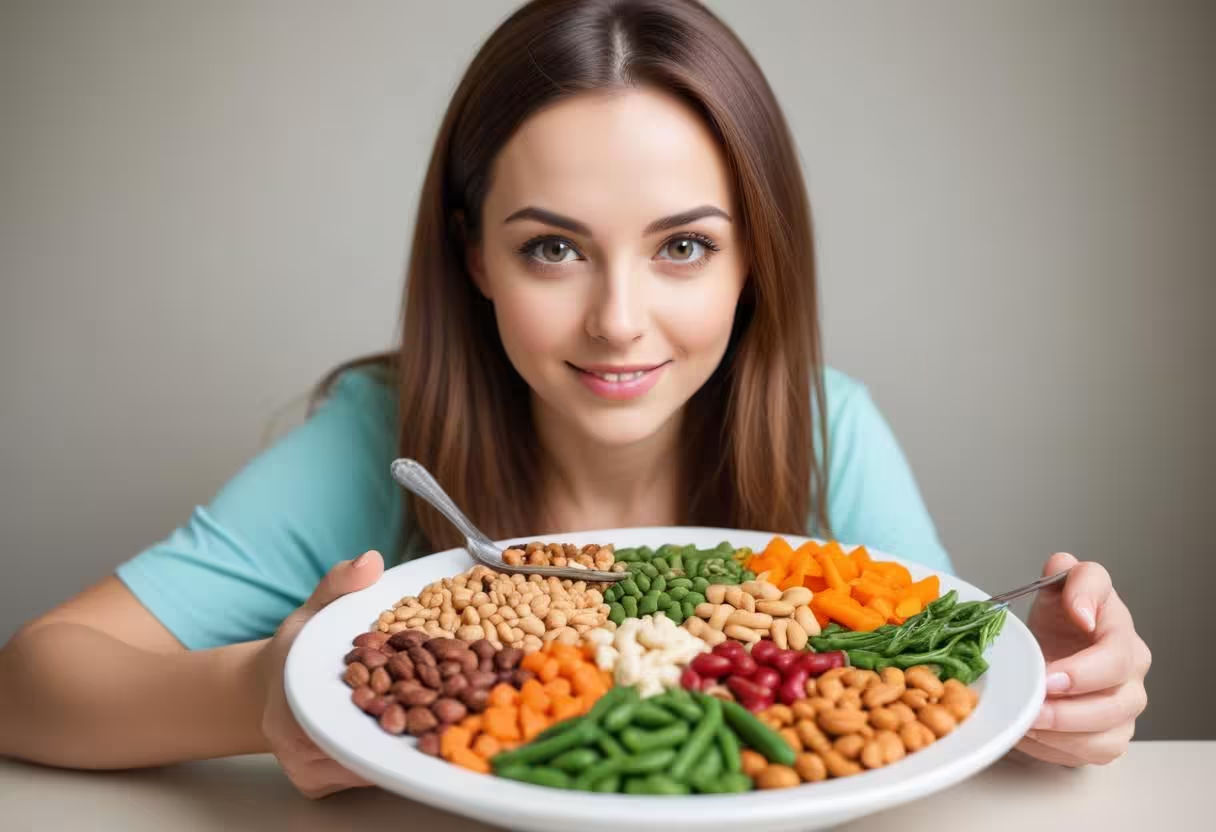Fitness Tips For Quick Weight Loss On A Vegetarian Diet

A vegetarian diet can be a powerful tool for rapid weight loss, but only if you harness its full potential. By focusing on nutrient-dense, fiber-rich foods and incorporating strategic exercise like high-intensity interval training (HIIT), you can accelerate your fat-burning process while maintaining muscle mass. Discover the secrets to optimizing your plant-based lifestyle for effective weight management and unlock the path to a healthier, leaner you.
Vegetarian Diet and Rapid Weight Loss
Maximizing Weight Loss on a Vegetarian Diet
A vegetarian diet can be an effective way to lose weight quickly, but it requires careful planning and execution. By focusing on nutrient-dense, low-calorie plant-based foods, vegetarians can create a calorie deficit that leads to rapid fat loss. However, common pitfalls like overconsuming carbs or relying too heavily on processed meat alternatives can undermine weight loss efforts.
Prioritize Fiber-Rich Whole Foods
The foundation of a weight-loss-friendly vegetarian diet. It should be high-fiber whole foods like leafy greens, cruciferous veggies, beans, lentils, and whole grains. These nutrient-dense foods are low in calories but high in fiber, which helps keep you feeling full and satisfied. Aim to make these foods the centerpiece of your meals, limiting intake of refined carbs, oils, and processed meat substitutes.
Manage Macronutrient Ratios
A vegetarian diet can be a powerful tool for rapid weight loss. However, it’s crucial to harness its full potential. Focus on nutrient-dense, fiber-rich foods. Incorporate strategic exercises like high-intensity interval training (HIIT). This approach will accelerate your fat-burning process and help maintain muscle mass. Discover how to optimize your plant-based lifestyle for effective weight management. Unlock the path to a healthier, leaner you.
Good vegetarian protein sources include:
- Legumes (beans, lentils, peas)
- Tofu, tempeh, and other soy products
- Nuts and seeds
- Protein-rich whole grains like quinoa
By emphasizing these foods, you can meet your protein needs effectively. This approach minimizes reliance on processed meat alternatives, which often contain high levels of sodium, fat, and calories.
Optimize Nutrient Intake
In addition to macros, it’s important for vegetarians to focus on micronutrient intake. Nutrients like iron, zinc, vitamin B12, and omega-3s are often lacking in plant-based diets, but are crucial for energy, metabolism, and overall health. Fortified foods, supplements, and careful meal planning can help ensure you’re meeting all your nutritional needs.
Manage Calorie Intake
Even healthy plant-based foods can be high in calories, so portion control is essential. Use a calorie tracking app or follow simple serving size guidelines to keep your intake in a moderate calorie deficit (around 500 calories below your maintenance level). Overeating healthy foods can still lead to weight gain.
Stay Hydrated and Active
In addition to your dietary approach, staying hydrated and physically active are crucial for rapid weight loss on a vegetarian diet. Aim for at least 64oz of water per day. Incorporate a mix of cardio, strength training, and HIIT workouts into your routine. This will help boost fat burning, preserve muscle mass, and enhance your overall health.
By emphasizing whole, fiber-rich plant foods, managing macros and calories, and staying active, vegetarians can lose weight quickly and safely. With the right approach, you can maximize the benefits of a plant-based diet while achieving your weight loss goals.
Boosting Metabolism on a Plant-Based Lifestyle: Vegetarian Diet
Unlocking the Power of Plants: Metabolism-Boosting Secrets
Maintaining a healthy weight can be a constant challenge, especially when following a plant-based diet. However, with the right strategies, you can leverage the power of plant-based foods to naturally boost your metabolism and achieve your weight loss goals.
The Role of Metabolism in Weight Management
Metabolism is the process by which your body converts the food you eat into energy. A faster metabolism means your body burns more calories, even at rest, making it easier to lose or maintain weight. Factors like age, muscle mass, genetics, and hormones can all influence your metabolic rate.
Nutrient-Dense Plant-Based Foods
One of the primary advantages of a plant-based lifestyle is the abundance of nutrient-dense foods that can support a healthy metabolism. Here are some metabolism-boosting plant-based superstars:
- Legumes: Beans, lentils, and peas are rich in protein, fiber, and complex carbohydrates, all of which help to stabilize blood sugar levels and keep your metabolism humming.
- Whole Grains: Quinoa, brown rice, and whole wheat are excellent sources of complex carbohydrates that provide sustained energy and support metabolic function.
- Spicy Foods: Compounds like capsaicin found in chili peppers and other spices can temporarily increase your metabolic rate and help you burn more calories.
- Green Tea: This antioxidant-rich beverage contains caffeine and catechins that may help to boost fat burning and enhance overall metabolic efficiency.
- Nuts and Seeds: Packed with healthy fats, protein, and fiber, nuts and seeds like almonds, walnuts, and chia seeds can contribute to a healthy metabolism.
Lifestyle Factors for Boosting Metabolism
In addition to a nutrient-dense plant-based diet, there are several lifestyle factors that can help to optimize your metabolism:
Exercise and Resistance Training
Engaging in regular physical activity, especially strength-building exercises, can help to increase your muscle mass and resting metabolic rate. Aim for a mix of aerobic exercise, such as brisk walking or cycling, and resistance training, like weightlifting or bodyweight exercises.
Staying Hydrated
Drinking plenty of water can support your body’s metabolic processes and help to prevent water retention, which can slow down weight loss efforts.
Managing Stress
Chronic stress can disrupt hormonal balance and negatively impact your metabolism. Practice stress-reducing techniques like meditation, yoga, or deep breathing to help keep your metabolism on track.
Getting Enough Sleep
Adequate sleep is crucial for maintaining a healthy metabolism. Aim for 7-9 hours of quality sleep each night to allow your body to properly regulate its metabolic functions.
By incorporating these plant-based nutrition and lifestyle strategies, you can unlock the power of your metabolism and achieve your weight management goals while enjoying the many benefits of a plant-based lifestyle.
Unlocking the Power of Nutrient-Dense Superfoods in a Vegetarian Diet for Sustainable Weight Loss
When it comes to achieving sustainable weight loss, the key lies in adopting a balanced and nutrient-rich diet. While fad diets may promise quick results, they often fail to provide the essential vitamins, minerals, and phytonutrients needed for long-term health and weight management. That’s where nutrient-dense superfoods come into play, offering a holistic approach to weight loss that nourishes the body and supports overall well-being.
Embracing the Superfood Advantage
Superfoods are a category of foods that are renowned for their exceptional nutritional profiles. These powerhouse ingredients are packed with an array of essential vitamins, minerals, fiber, and antioxidants that can help support a healthy weight, boost metabolism, and improve overall health. By incorporating these nutrient-dense superfoods into your diet, you can unlock a world of benefits that go beyond just weight loss.
Superfoods for Sustainable Weight Management
Here are some of the top nutrient-dense superfoods that can contribute to sustainable weight loss:
- Leafy Greens: Kale, spinach, arugula, and other leafy greens are low in calories yet high in fiber, vitamins, and minerals. They’re also rich in antioxidants that can help reduce inflammation and support a healthy metabolism.
- Berries: Blueberries, raspberries, and blackberries are bursting with fiber, vitamins, and antioxidants. These nutrient-dense fruits can help curb cravings, support gut health, and contribute to a feeling of fullness.
- Avocados: This creamy superfood is packed with healthy fats, fiber, and a variety of essential vitamins and minerals. Avocados can help promote feelings of satiety, support heart health, and contribute to a balanced diet.
- Quinoa: This ancient grain is a complete protein, meaning it contains all the essential amino acids. Quinoa is also high in fiber and various minerals, making it a nourishing addition to any weight management plan.
- Chia Seeds: These tiny seeds are a powerhouse of fiber, protein, and omega-3 fatty acids. Chia seeds can help regulate blood sugar levels, promote feelings of fullness, and support overall metabolic health.
- Lentils: Lentils are a versatile legume that are high in fiber, protein, and complex carbohydrates. They can help stabilize blood sugar levels, support gut health, and contribute to a feeling of fullness.
- Salmon: Fatty fish like salmon are rich in omega-3 fatty acids, which can help reduce inflammation, support heart health, and contribute to a healthy metabolism.
Superfoods into Your Diet
Integrating nutrient-dense superfoods into your daily routine doesn’t have to be complicated. Here are some easy ways to incorporate them:
- Start your day with a superfood-packed smoothie or bowl, combining leafy greens, berries, chia seeds, and other nutrient-dense ingredients.
- Incorporate quinoa, lentils, or avocado into your main meals, such as salads, stir-fries, or grain bowls.
- Snack on a handful of mixed nuts or seeds, or enjoy some fresh berries with a dollop of Greek yogurt.
- Swap out processed snacks for nutrient-dense options like carrot sticks with hummus or apple slices with nut butter.
By embracing the power of nutrient-dense superfoods, you can create a sustainable approach to weight management that nourishes your body, boosts your metabolism, and supports your overall health and well-being.
Incorporating High-Intensity Interval Training into a Vegetarian Diet Routine

High-Intensity Interval Training into a Vegetarian Routine
As a vegetarian, you may be concerned about maintaining a healthy and balanced lifestyle, particularly when it comes to fitness and weight management. One effective strategy that can help you achieve your goals is the incorporation of high-intensity interval training (HIIT) into your routine.
The Benefits of HIIT for Vegetarians
HIIT is a form of exercise that alternates between short bursts of intense activity and periods of rest or lower-intensity activity. This type of training has been shown to be highly effective in promoting weight loss, improving cardiovascular health, and increasing overall fitness levels. For vegetarians, HIIT can be especially beneficial, as it can help to compensate for any potential nutrient deficiencies or challenges associated with a plant-based diet.
Boosting Metabolism
One of the key advantages of HIIT for vegetarians is its ability to boost metabolism. The intense bursts of activity during HIIT workouts cause your body to burn a significant amount of calories, even after the workout is completed. This can help to offset any potential difficulties in achieving a calorie deficit on a vegetarian diet, which may be necessary for weight loss.
Improving Cardiovascular Health
Vegetarians are often at a lower risk of developing certain cardiovascular diseases, such as heart disease and high blood pressure. However, incorporating HIIT into your routine can further enhance your cardiovascular health by improving your heart’s ability to pump blood more efficiently and reducing the strain on your cardiovascular system.
Increasing Muscle Mass
While vegetarians may face challenges in building and maintaining muscle mass due to the limitations of a plant-based diet, HIIT can help to counteract this. The intense nature of HIIT workouts stimulates the growth and development of muscle fibers, which can contribute to a leaner, more toned physique.
HIIT into a Vegetarian Routine
To incorporate HIIT into your vegetarian routine, there are a few key considerations to keep in mind:
Choosing the Right HIIT Exercises
When selecting HIIT exercises, it’s important to choose activities that are suitable for your fitness level and that can be adapted to a vegetarian lifestyle. Some popular HIIT exercises for vegetarians include:
- Bodyweight exercises (e.g., burpees, jumping jacks, mountain climbers)
- Cycling or stationary cycling
- Rowing
- Jumping rope
Balancing HIIT with a Vegetarian Diet
To ensure that your body is receiving the necessary nutrients to support your HIIT workouts, it’s important to pair your HIIT routine with a well-balanced vegetarian diet. This may include:
- Consuming a variety of plant-based protein sources, such as legumes, tofu, tempeh, and seitan
- nutrient-dense vegetables, fruits, and whole grains
- Ensuring adequate intake of essential vitamins and minerals, such as iron, calcium, and vitamin B12
Allowing for Proper Recovery
HIIT workouts can be quite demanding on the body, so it’s important to allow for adequate recovery time between sessions. This may include incorporating rest days, engaging in low-intensity activities, and ensuring that you’re getting enough sleep and hydration.
High-intensity interval training into a vegetarian routine can be a highly effective strategy for achieving your fitness and weight loss goals. By taking advantage of the benefits of HIIT, such as improved metabolism, cardiovascular health, and muscle development, you can optimize your vegetarian lifestyle and enjoy the many rewards of a healthy, active lifestyle.
Maintaining Muscle Mass while Cutting Calories on a Meatless: Vegetarian Diet
Mastering the Art of Muscle Preservation on a Meatless Diet
Embarking on a weight loss journey can be a challenging endeavor, especially when you’ve opted for a vegetarian or vegan lifestyle. Maintaining muscle mass while cutting calories can seem like a daunting task, but it’s not an impossible feat. With the right strategies and a focused approach, you can achieve your weight loss goals while preserving your hard-earned muscle.
The Importance of Protein Intake
Protein is a crucial macronutrient for muscle maintenance and growth. When you’re on a calorie-restricted diet, it’s essential to ensure that you’re consuming enough high-quality, plant-based proteins to support your muscle-building efforts. Good sources of vegetarian protein include legumes, tofu, tempeh, seitan, quinoa, and a variety of nuts and seeds.
Strategizing Your Calorie Deficit
Achieving a moderate calorie deficit is key to successful weight loss while maintaining muscle mass. Aim for a deficit of around 500 calories per day, which can lead to a steady weight loss of 1-2 pounds per week. Avoid drastic calorie reductions, as they can lead to muscle loss and a slower metabolism.
Resistance Training
Regular resistance training is essential for preserving and even building muscle while on a vegetarian weight loss plan. Incorporate a mix of compound exercises that target multiple muscle groups, such as squats, deadlifts, push-ups, and pull-ups. Aim for 2-3 strength-training sessions per week, allowing for adequate rest and recovery between sessions.
Timing Your Protein Intake
Strategically timing your protein intake can help maximize muscle preservation. Consume a serving of high-quality plant-based protein within 30 minutes of your strength-training workouts. This helps provide your muscles with the essential amino acids they need to repair and grow.
Prioritizing Nutrient-Dense Foods
While cutting calories, it’s crucial to focus on nutrient-dense, whole-food sources rather than processed or refined options. Fill your plate with a variety of fruits, vegetables, whole grains, and healthy fats to ensure you’re getting all the necessary vitamins, minerals, and antioxidants to support your overall health and muscle maintenance.
Staying Hydrated
Proper hydration is essential for muscle recovery and overall bodily function. Aim to drink plenty of water throughout the day, and consider adding electrolyte-rich beverages, such as coconut water or herbal teas, to your routine.
Managing Stress and Getting Enough Sleep
Chronic stress and lack of sleep can have a negative impact on muscle preservation, as they can lead to increased cortisol levels and impaired recovery. Prioritize stress-management techniques, such as meditation, yoga, or deep breathing exercises, and aim for 7-9 hours of quality sleep each night.
By implementing these strategies, you can successfully navigate the balance between weight loss and muscle preservation on a meatless diet. Remember, progress takes time and consistency, so be patient with yourself and celebrate your small victories along the way.

Conclusion: Unlocking Rapid Weight Loss on a Vegetarian Diet: Strategies for Success
Shedding pounds on a vegetarian diet might seem challenging, but with the right strategies, it can be both rewarding and sustainable. Harness the power of nutrient-dense superfoods, such as leafy greens, berries, and avocados, which are rich in essential vitamins and low in calories. Boost your metabolism by including protein-rich legumes, nuts, and whole grains in your meals, and spice things up with cayenne pepper and ginger for an extra metabolic kick.
Incorporate high-intensity interval training (HIIT) into your fitness routine to enhance fat burning and metabolic function. This, combined with a diet full of plant-based superfoods, creates a powerful synergy for rapid weight loss. Also, focus on maintaining lean muscle mass through strength training and balanced vegetarian protein sources. By following these strategies, you can achieve effective and sustainable weight loss while enjoying the benefits of a plant-based lifestyle.
For more information, explore our website. You can find answers to common questions in our FAQ section, learn more about us on our Home page, discover the range of services we offer in the What We Provide section, get in touch with us through the Contact page, and stay connected with us on our Socials.
You can now buy my E-Book on discount for only $4, or if you want a personalized training program, you can reach out to me on Instagram.






